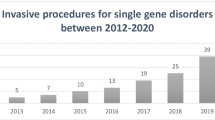Abstract
The incidence of congenital anomalies and/or genetic disorders in the Omani population has reached figures greater than double the global statistics. Preference for consanguineous unions together with the fact that termination of pregnancy in Muslim communities are largely avoided, have been highlighted as contributing factors. This overview identifies a third significant aspect contributing to the elevated rate of genetic disorders in the Omani population. Namely, a lack of services that are able to offer termination of pregnancy for severe congenital anomalies, to requesting parents. In this report we select an unusual case of a family at risk for two distinct genetic disorders - 6q micro-deletion and unbalanced products of conception attributed to a balanced parental translocation involving chromosome 3 and 13, to portray and examine the current situation faced by Omani couples interested in prenatal diagnosis for termination of pregnancy. Additional challenges and pitfalls to developing a prenatal diagnostic service as part of the genetic service in Oman are discussed.


Similar content being viewed by others
References
Albar, M. (1999). Counselling about genetic disease: An Islamic perspective. Eastern Mediterranean Health Journal, 5, 1129–1133.
Al-Gazali, L., Hamamy, H., & Al-Arrayad, S. (2006). Genetic disorders in the Arab world. BMJ, 333, 831–834.
Alkuraya, F. S., & Kilani, R. A. (2001). Attitude of Saudi families affected with hemoglobinopathies towards prenatal screening and abortion and the influence of religious ruling (fatwa). Prenatal Diagnosis, 21, 448–451.
Alwan, A., Modell, B., & Community control of genetic and congenital disorders. (1997). Eastern Mediterranean regional office technical publication series 24. Alexandria: World Health Organization.
Aramesh, K. (2007). The influences of bioethics and Islamic jurisprudence on policy-making in Iran. American Journal of Biotechnology, 7, 42–44.
Bache, I., Brondum-nielsen, K., & Tommerup, N. (2007). Genetic counseling in adult carriers of a balanced chromosomal rearrangement ascertained in childhood: Experiences from a nationwide reexamination of translocation carriers. Genetics in Medicine, 9(3), 185–187.
Bittles, A. H., & Hamamy, H. A. (2010). Endogamy and consanguineous marriage in Arab populations. In A. S. Teebi (Ed.), Genetic disorders among Arab populations (2nd ed., pp. 85–108). Berlin-Heidelberg: Springer Verlag.
Gardner, R. J., & Sutherland, G. R. (2004). Chromosome abnormalities and genetic counseling. New York: Oxford University Press.
Hussain, R. (1999). Community perceptions of reasons for preference for consanguineous marriage in Pakistan. Journal of Biosocial Science, 31, 449–461.
Jaber, L., Shohat, T., & Halpern, G. J. (1996). Demographic characteristics of the Israeli Arab community in connection with consanguinity. Israel Journal of Medical Sciences, 32, 1286–1289.
Jacobs, P. A., Browne, C., Gregson, N., Joyce, C., & White, H. (1992). Estimates of the frequency of chromosome abnormalities detectable in unselected newborns using the moderate levels of banding. Journal of Medical Genetics, 29, 103–108.
Jafri, H., Ahmed, S., Ahmed, M., Hewison, J., Raashid, Y., & Sheridan, E. (2012). Islam and termination of pregnancy for genetic conditions in Pakistan: Implications for Pakistani health care providers. Prenatal Diagnosis, 32, 1218–1220.
Khlat, M., Halabi, S., Khudr, A., & Der Kaloustian, V. M. (1986). Perceptions of consanguineous marriages and their genetic effects among a sample of couples from Beirut. American Journal of Medical Genetics, 25, 299–306.
Rajab, A., & Patton, M. A. (2000). A study of consanguinity in the Sultanate of Oman. Annals of Human Biology, 27(3), 321–326.
Rajab, A., Al Rashdi, I., & Al, S. Q. (2013). Genetic services and testing in the Sultanate of Oman. Sultanate of Oman steps into modern genetics. Community Genetics. doi:10.1007/s12687-013-0153-1.
Sasongko, T. H., Salmi, A. R., Zilfalil, B. A., Albar, M. A., & Hussin, Z. A. M. (2010). Permissibility of prenatal diagnosis and abortion for fetuses with severe genetic disorder: Type 1 spinal muscular atrophy. Annals of Saudi Medicine, 30(6), 427–431.
Shoham-Vardi, I., Weiner, N., Weitzman, D., & Levcovich, A. (2004). Termination of pregnancy: Attitudes and behavior of women in a traditional society. Prenatal Diagnosis, 24, 869–875.
Wentzel, C., Lynch, S. A., Stattin, E. L., Sharkey, F. H., Anneren, G., & Thuresson, A. C. (2010). Interstitial deletions at 6q14.1-q15 associated with obesity, developmental delay and a distinct clinical phenotype. Molecular Syndromol, 1, 75–81.
Acknowledgments
We are very grateful to the participating family for their co-operation and willingness to share their experiences that shaped this study. The patient has been submitted to DECIPHER (http://decipher.sanger.ac.uk/).
Funding
None
Conflict of Interest
Zandrè Bruwer, Udayakumar Achandira, Khalsa Al Kharousi, Adila Al-Kindy declare they have no conflict of interest.
Human Studies and Informed Consent
All procedures followed were in accordance with the ethical standards of the responsible committee on human experimentation (institutional and national) and with the Helsinki Declaration of 1975, as revised in 2000 (5). Informed consent was obtained from all patients for being included in the study.
Author information
Authors and Affiliations
Corresponding author
Rights and permissions
About this article
Cite this article
Bruwer, Z., Achandira, U., Al Kharousi, K. et al. Existing Challenges Associated with Offering Prenatal Genetic Diagnosis in an Arab Society in the Sultanate of Oman. J Genet Counsel 23, 928–932 (2014). https://doi.org/10.1007/s10897-014-9764-x
Received:
Accepted:
Published:
Issue Date:
DOI: https://doi.org/10.1007/s10897-014-9764-x




